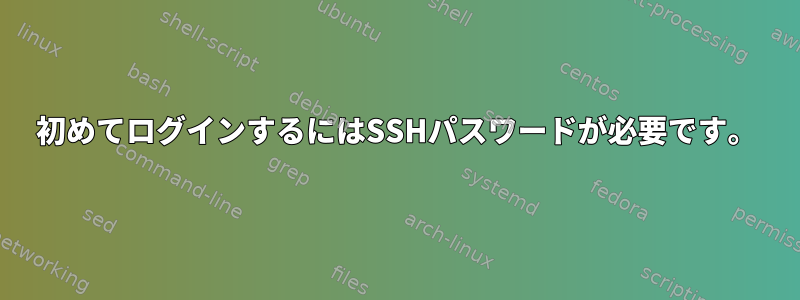
そのため、SSHで奇妙な問題が発生しました。 SSHキーを介してパスワードのないログインを許可するようにSSHサーバーを設定しました。しかし、長い時間(〜日)後に初めてログインしようとすると、パスワードが必要です。すぐに接続を閉じて SSH 接続を再試行すると、SSH キーが許可されます。いつもSSHキーを許可する方法を知っている人はいますか?
これは私のものです。/etc/ssh/sshd_config
# Package generated configuration file
# See the sshd_config(5) manpage for details
# What ports, IPs and protocols we listen for
Port 22
# Use these options to restrict which interfaces/protocols sshd will bind to
#ListenAddress ::
#ListenAddress 0.0.0.0
Protocol 2
# HostKeys for protocol version 2
HostKey /etc/ssh/ssh_host_rsa_key
HostKey /etc/ssh/ssh_host_dsa_key
HostKey /etc/ssh/ssh_host_ecdsa_key
HostKey /etc/ssh/ssh_host_ed25519_key
#Privilege Separation is turned on for security
UsePrivilegeSeparation yes
# Lifetime and size of ephemeral version 1 server key
KeyRegenerationInterval 3600
ServerKeyBits 1024
# Logging
SyslogFacility AUTH
LogLevel INFO
# Authentication:
LoginGraceTime 120
PermitRootLogin without-password
StrictModes yes
RSAAuthentication yes
PubkeyAuthentication yes
#AuthorizedKeysFile %h/.ssh/authorized_keys
# Don't read the user's ~/.rhosts and ~/.shosts files
IgnoreRhosts yes
# For this to work you will also need host keys in /etc/ssh_known_hosts
RhostsRSAAuthentication no
# similar for protocol version 2
HostbasedAuthentication no
# Uncomment if you don't trust ~/.ssh/known_hosts for RhostsRSAAuthentication
#IgnoreUserKnownHosts yes
# To enable empty passwords, change to yes (NOT RECOMMENDED)
PermitEmptyPasswords no
# Change to yes to enable challenge-response passwords (beware issues with
# some PAM modules and threads)
ChallengeResponseAuthentication no
# Change to no to disable tunnelled clear text passwords
#PasswordAuthentication yes
# Kerberos options
#KerberosAuthentication no
#KerberosGetAFSToken no
#KerberosOrLocalPasswd yes
#KerberosTicketCleanup yes
# GSSAPI options
#GSSAPIAuthentication no
#GSSAPICleanupCredentials yes
X11Forwarding yes
X11DisplayOffset 10
PrintMotd no
PrintLastLog yes
TCPKeepAlive yes
#UseLogin no
#MaxStartups 10:30:60
#Banner /etc/issue.net
# Allow client to pass locale environment variables
AcceptEnv LANG LC_*
Subsystem sftp /usr/lib/openssh/sftp-server
# Set this to 'yes' to enable PAM authentication, account processing,
# and session processing. If this is enabled, PAM authentication will
# be allowed through the ChallengeResponseAuthentication and
# PasswordAuthentication. Depending on your PAM configuration,
# PAM authentication via ChallengeResponseAuthentication may bypass
# the setting of "PermitRootLogin without-password".
# If you just want the PAM account and session checks to run without
# PAM authentication, then enable this but set PasswordAuthentication
# and ChallengeResponseAuthentication to 'no'.
UsePAM yes
`
答え1
これは、Active DirectoryやLDAPを含むシステムなど、自動的にマウントされたホームディレクトリを持つシステムで発生する可能性があります。mountログイン後にホームディレクトリが自動的にマウントされていることを確認するには、入力してください。残念ながら、私が知っている限り、この問題を解決する方法はありません。通常、SSH認証中にすべてのユーザーのホームディレクトリを使用できるように、/ homeディレクトリ全体がマウントされます。
答え2
@ポールの答えこれは可能な解決策を見つけるのに非常に役立ちます。この問題を解決するには、次のようにmount rootを使用し--bindてsshをコピーします。authorized_keys
mkdir /mnt/root
mount --bind / /mnt/root
cp -a ~/.ssh /mnt/root/user
これ含まれているファイルシステムを次にマウントします。/mnt/rootuser、マウントポイントにアクセスし(ユーザー名に置き換える必要があります)、マウント.sshする前に暗号化されたファイルシステムにアクセスできるようにフォルダをコピーします。
答え3
私もこれが起こりましたが、/homeパーティションは別々にインストールされませんでした。ただし、アカウントを作成するときに自分のホームフォルダの暗号化オプションを使用し、アカウントがインストールされている/home/.encryptfs/<userid>/.Privateことを確認したため、/home/<userid>私のホームフォルダの暗号化オプションが原因でこの動作が発生した可能性があります。


